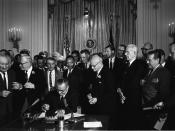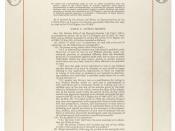In 1964, the Civil Rights Act prohibited discrimination based on race, color, religion, national origin, or sex (The National Archives, n.d.). Passing the Civil Rights Act may very well have been the easiest part in establishing and instituting this law in comparison to trying to change the minds, beliefs, and attitudes of the public. There have been, and still are, career fields traditionally thought to be better occupied by men because of strength and endurance requirements, stress, or inherent hazards. The lingering attitude, and excuse, was that females cannot handle or perform well in certain positions because of their feminine, delicate, or sensitive psyches, while males are masculine, rugged and could perform better. The military and law enforcement serve as examples; however, labor laws and societal views have changed and with it, more career fields have opened to women. Unfortunately, there are still residual biases, which have become the subject for review and experimentation to scientifically or officially prove or disprove disputed beliefs in the ability of individuals to perform in certain environment based exclusively on gender.
The experiment analyzed and critiqued throughout this paper addresses the association of gender and perceived stress in the correctional career field. Additionally, aspects such as variables, sampling, and study factuality will be reviewed and discussed as they apply to the experiment.
The Experiment
The purpose of the experiment was to gather data to determine the validity of the belief that males and females experience different levels of stress in similar work environments, under the same work conditions, based exclusively on gender (Griffin, n.d., pg. 4). Specifically, this test examined male and female correctional officers and the similarities or differences in the reaction to perceived workplace stressors, and to dispel the misconception that females are more prone to stress than males in certain professions.


